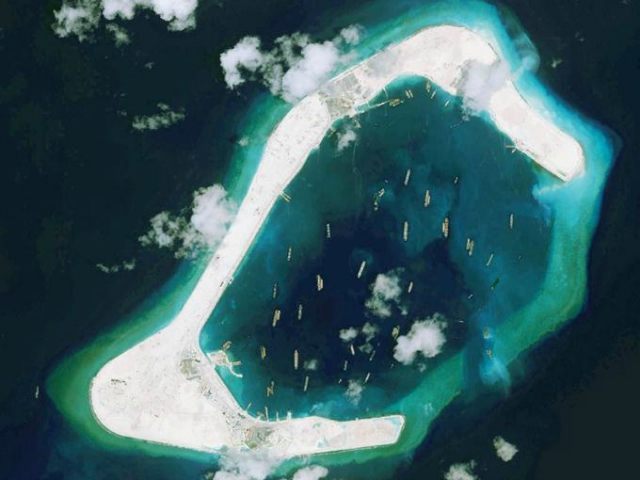Chinese President Xi Jinping, on a diplomatic visit to London, has reiterated to Reuters his nation’s claim that the entirety of the South China Sea belongs to China, asserting that the islands in that region were “left to us by our ancestors” and cannot be shared with neighboring countries.
In what Reuters is calling an “exclusive interview,” but is a transcript of remarks by Chinese government officials “reviewed and approved by Xi himself,” Xi addressed a number of topics, ranging from concerns about the Chinese economy to the developing relationship between Beijing and London. When asked about the South China Sea disputes–Vietnam, Malaysia, the Philippines, and Brunei, among others, stake claims in the region–Xi asserted that China did not see the region as international waters.
“The islands and reefs in the South China Sea are Chinese territory since ancient times,” he said. “They are left to us by our ancestors. The Chinese people will not allow anyone to infringe on China’s sovereignty and related rights and interests in the South China Sea.”
Xi did note, however, that China “would not want any turbulence there,” rebuffing claims that it has stirred controversy in the region by attacking foreign ships.
In late 2013, China began constructing artificial islands in the South China Sea, as well as antagonizing foreign ships in the area. In December of that year, a Chinese warship confronted an American vessel, leading to what reports called a “near-collision.”
With other nations, Chinese ships have not been so charitable. Last week, the captain of a Vietnamese fishing vessel accused a Chinese ship of ramming into his own until it sank, while Chinese crewmen raided the fishermen’s catch and any valuables on board. The crew was forced to survive on lifeboats for four hours before being saved. The incident occurred near the Paracel Islands, which Vietnam claims as its own. “Chinese actions against fishermen from Quang Ngai province have been more aggressive and brutal,” according to local Fisheries Association president, Phan Huy Hoang.
The government of the Philippines has cited similar incidents near the Spratly Islands, which China also claims as its own, as cause for alarm. President Benigno Aquino has compared the Chinese government to Nazi Germany in attempts to emphasize the danger of allowing Chinese expansion in the region.
In addition to attacking foreign ships, China has been building a number of military assets in the region, including landing strips, lighthouses, and artificial islands, whose use has yet to be identified through satellite images. China has destroyed at least 17 reefs in the process, according to environmental advocacy groups.
“The South China Sea, as the name indicated, is a sea area. It belongs to China,” said Vice Adm. Yuan Yubai at an event in September. His remarks echo the position of Xi in his latest interview and that of a number of representatives of the Chinese government. In addition to asserting their right to build in the region, a number of Chinese government officials have claimed there are no military facilities being built in the area.
Last week, China’s Vice-Foreign Minister Liu Zhenmin asserted that “countries alongside the South China Sea and vessels sailing through the waters will receive better service.” The construction in the South China Sea was “mainly carried out for civil purposes,” insisted Fan Changlong, vice-chairman of China’s Central Military Commission. “There is no militarization of the islands,” asserted Yan Xuetong, dean of the Institute of Modern International Relations at Beijing’s Tsinghua University.
The United States is planning a free navigation exercise in the South China Sea along with Australian allies. The announcement of such an event triggered a stern complaint from the Chinese embassy in Australia. “It would be more helpful if they could honour their commitment of not taking sides on relevant disputes and do more to promote regional peace and stability in the true sense of the words rather than light a fire and add fuel to the flames,” the embassy said in a statement.
Secretary of State Ashton Carter dismissed China’s concern. “The United States will fly, sail and operate wherever international law allows,” he responded. “The South China Sea is not and will not be an exception.”

COMMENTS
Please let us know if you're having issues with commenting.